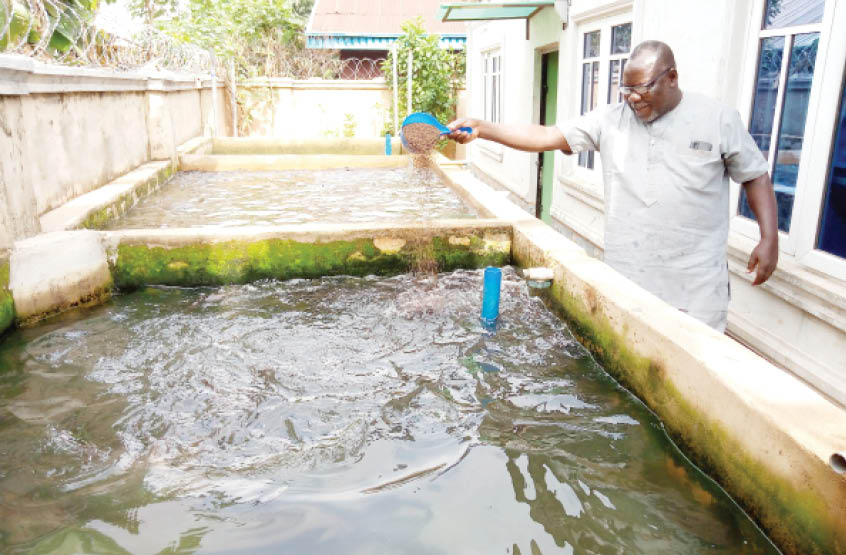Fish farming worth it despite challenges – Ekemita
Many people are going into fish farming to make ends meet in the absence of dwindling white-collar jobs across the country. Mr. Jimoh Yakubu Ekemita, a businessman and fish farmer, told Daily Trust on Sunday that he still makes progress despite the many challenges in fish farming business. Jimoh, who owns three compartments of fish […]

The farmer feeding his fishes
Many people are going into fish farming to make ends meet in the absence of dwindling white-collar jobs across the country.
Mr. Jimoh Yakubu Ekemita, a businessman and fish farmer, told Daily Trust on Sunday that he still makes progress despite the many challenges in fish farming business.
Jimoh, who owns three compartments of fish ponds in his compound located in Benin, said he had already bought a 100 by 100 plot of land for fish farming as soon as he is able to raise capital.
He said he developed interest in fish farming after having an encounter with some fish farmers in Warri, Delta State.
“While I was in Warri, I saw people using earth pond for fish farming, and I got interested, and after sometimes, I discovered that they are also using concrete pond. So, when I relocated to Benin, I decided to test-run a small one and I found it useful hence I decided to embark on fish farming.”
He said before starting the business, he went for training for three weeks to get acquainted with the rudiments of fish farming and also to be able to do it well and make profit.
“The three fish ponds that have the capacity of 3000 fishes cost me between N150,000 and N200,000 to prepare the pond, and it cost me N150,000 to stock the pond with fish. I bought fingerlings at the cost of N50 each.”
According to him, one has to be meticulous in the rearing of fish, especially the aspect of feeding, knowing when to change water and sorting of the fish as they grow bigger.
“To make sure that the fishes do well after one month of stocking the pond, you carry out sorting by separating the big ones from the small ones for better yield.
“Sorting is necessary in fish farming to avoid under feeding the small ones. If the big ones and the small ones are in the same pond, the small ones would be under fed, as they can’t compete with the matured ones in terms of feeding. This will reduce the profit.
“In stocking the pond, one also has to be very careful because if you purchase the ones with stunted growth, it will be hard to make profit, as you can hardly get the big size and it will take longer period to mature.”
On the challenges, Jimoh said the major challenges are fund, water and feeds.
He said, “Water is important in fish farming because there are stages you must distil water from the pond every day if they are to grow well. And we rely on generating set to pump water due to epileptic power supply. On a daily basis, I spent N2500 on fuel to pump water from the borehole to be able to distil water from the pond to pave the way for fresh one on a daily basis.
“Also, we have the challenge of feeds. Before now, we usually buy feed at N6,500, but it is now sold for N10,500.”
He said they also have the challenge of contaminated feeds, which at times could lead to losing the entire fish in the pond.
“My colleague bought such feed and after using it, he lost 200 fish in a day and we later discovered the feed was bad and in other not to lose everything, he sold the remaining fish at a giveaway price.”
Jimoh lamented that the issue of getting loan or grant has been a challenge in the business, saying he has never gotten a loan or grant from the government as well taken loan from the commercial bank.
“During my training, they gave us a form to fill, that government will give loans to small scale farmers, but that never happened. I also applied with FADAMA but that never saw the light of the day.
He said he went to commercial banks to seek for loan, but the stringent criteria and high interest rate pushed him away.
“I now relied on individual lenders who lend money with interest rate of 15 per cent to get loan.”
He said harvest and selling of the fish are somehow challenging to them as the retailers often short-change them in terms of pricing.
On the profit, Jimoh said, despite the challenges, he is still making little profit.
“If the fishes grow well, definitely, there would be profit. If you spend like N500,000 on it, you would likely get between N200,000 and 250,000 per batch, and you can harvest your fish every four months.”
He said that if one can dry fish, it is also profitable, though it is expensive and stressful. I have an oven and to dry 50 fish; one would exhaust 12.5 kg of gas and it takes two days to dry them.
But I prefer to supply to companies and hotels as well as sell to individuals; it is better, quicker and less stressful.”
He, however, called on government to assist small-scale fish farmers by making loans and grant available to them as well as providing constant electricity supply.
“I have a 100 by 100 plot designed for fish farming, but I don’t have the capital to start. I will put it to use as soon as fund is available,” he said.
